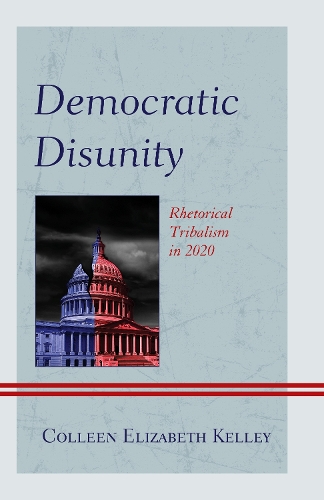
Democratic Disunity: Rhetorical Tribalism in 2020
(Hardback)
Publishing Details
Democratic Disunity: Rhetorical Tribalism in 2020
By (Author) Colleen Elizabeth Kelley
Bloomsbury Publishing PLC
Lexington Books
13th January 2022
United States
Classifications
Professional and Scholarly
Non Fiction
324.2736
Physical Properties
Hardback
236
Width 161mm, Height 237mm, Spine 21mm
485g
Description
Democratic Disunity: Rhetorical Tribalism in 2020 addresses that while attention has recently and rightly been paid to the tribal bifurcation of the GOP, the Democratic Party is similarly divided. Americans live in a democratic republic rather than a direct democracy and choices regarding governing concerns are configured through communicative action. These choices include those made between and within American political parties. Without rhetorical mediation and intervention, toxic partisan tribalism within the two major American political parties is likely to destabilize the nations federalist system of government. Kelley argues that intraparty tribalism poisons public life and consumes public space within which electoral politics, including discussion, deliberation and compromise, should be thriving. Democratic Disunity considers intraparty tribalism as a rhetorical form, uniquely positioned within the twenty-first century. Details are provided regarding language-in-use strategies with which to anchor a rhetoric of governing through a mindful, deliberative dialogue which diminishes the effect of political partisanship, including its toxic variations both between and within American political parties. Scholars and students of rhetoric, political communication, and political science will find this book particularly interesting.
Reviews
As a reader trying to make sense of political disorder throughout the pandemic, I celebrate the humane reflections in Democratic Disunity: Rhetorical Tribalism in 2020. This well-written and tightly reasoned book analyzes the rhetorical workings of group identifications delineated as tribalism. Dr. Colleen Kelley highlights the significance of destabilizing between-and-within-party communication practices that impact US democracy. Her final chapters and conclusions move the reader smoothly toward remedial measures that offer hope for reconciliation through judicious rhetorical acts.
-- Anna Eblen, Western Washington UniversityDemocratic Disunity: Rhetorical Tribalism in 2020 is excellent and a rarity these days: interesting, extremely well-written and addressing profound questions. Dr. Kelley examines the relationship among rhetoric, civility, power and politics. She describes the current political situation as toxic partisan tribalism, steadily worsening since the end of the Cold War. The contentious 2020 presidential campaign laid bare these deep divisions in American society, exhibiting tribal politics. Remedies are not easy but might involve think(ing) about what you dont know and check(ing) your assumptions. Above all, a thought-provoking book.
-- John Gamble, The Pennsylvania State UniversityAuthor Bio
Colleen Elizabeth Kelley is associate professor of rhetorical communication at Penn State Erie.
